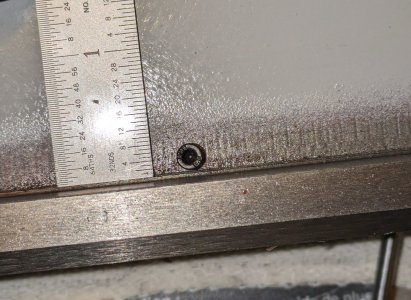- Joined
- Nov 6, 2012
- Messages
- 128
I was drilling the 2nd of five 2.5mm holes in in 7x16 LMS lathe bed to mount the rack, and broke off the bit as it punched through. I was using a piece of 1/4” square stock set on the ways shoulder to keep me from going too far, with the drill bit all the way into the battery-powered drill, but when it punched through, I must have lost true and - snap.
Any suggestions on how to do it better with a manual drill? No drill press handy… Ten new bits will arrive from Amazon tomorrow. Fortunately, I could push out the broken bit in the hole as I had flooded with Tap Magic while drilling.
BRET
Any suggestions on how to do it better with a manual drill? No drill press handy… Ten new bits will arrive from Amazon tomorrow. Fortunately, I could push out the broken bit in the hole as I had flooded with Tap Magic while drilling.
BRET


